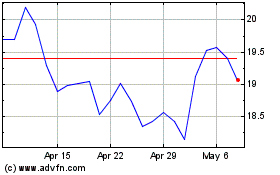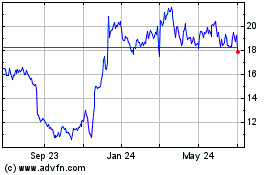By Sarah Nassauer and Suzanne Kapner
This article is being republished as part of our daily
reproduction of WSJ.com articles that also appeared in the U.S.
print edition of The Wall Street Journal (May 18, 2018).
A strong U.S. economy and recent store improvements are helping
Walmart Inc., Macy's Inc. and other big retail chains replace
business lost to online rivals.
Buoyed by low unemployment and rising wages, Americans are
stepping up purchases of everything from apparel to groceries to
dishwashers. Meanwhile, many retailers, stung by competition from
Amazon.com Inc., have closed hundreds of weaker stores, leaving
them with leaner inventories and better locations.
But not all chains are benefiting -- J.C. Penney Co. and
Nordstrom Inc. reported weak quarterly sales on Thursday -- and
executives at several chains said cold April weather weighed on the
latest results.
Some that reported results this week also said they hadn't yet
seen much of a boost from the U.S. tax overhaul that should leave
households with more spending money this year.
Walmart, the world's biggest retailer, said Thursday that sales
in its latest quarter rose both online and in stores, driven by
higher grocery sales and more competitive prices and services
online. The results eased some fears earlier this year that growth
on the e-commerce side of its business was slowing.
The economy is strong overall, though some shoppers are feeling
the pinch from rising gas prices, said Walmart Chief Financial
Officer Brett Biggs in an interview. "What we are seeing in the
stores feels like what it's felt like over the last 24 to 48
months," he said.
The Commerce Department said Tuesday that April retail sales --
a measure of spending at stores, shopping websites and restaurants
-- rose a seasonally adjusted 0.3% from the prior month. The April
increase followed stronger-than-expected growth for March, a relief
for analysts who had worried about a late-winter slowdown in
consumer spending.
Walmart reported that U.S. same-store sales rose 2.1% in the
quarter ended April 30. Its e-commerce sales rose 33% from a year
earlier, topping 23% growth for the preceding quarter. E-commerce
still accounts for a sliver of the company's business, but it is
the fastest growing part.
Grocery sales were strong, although other product sales were
somewhat sluggish due to "unseasonably cool weather in April,"
Walmart said. That has since reversed, said executives.
Penney and Home Depot Inc., which reported earlier this week,
also cited cool weather for sluggish April sales. Home Depot's
same-store sales still rose 4.2%, driven by home-improvement
projects.
Shares of Penney fell 12% on Thursday, while Walmart shares
slipped 1.9% and Macy's gained 2%.
On Wednesday, Macy's said sales, excluding newly opened or
closed locations, rose 3.9% in its latest quarter, a sign that the
department-store giant is pulling out of a prolonged slump. "The
customer is feeling confident, and is out there ready to spend,"
Macy's CEO Jeff Gennette said Wednesday.
He added that tax cuts are benefiting both consumers and
companies. "We've been able to go faster with our initiatives based
on the corporate tax cut," he said.
Penney suffered from continuing weakness in its women's and
children's apparel offerings and supply-chain problems that forced
it to liquidate some holiday goods. But it said it continued to
pick up market share for appliances as Sears Holdings Corp. closed
stores.
Nordstrom's shares fell more than 6% in after-hours trading
after the retailer reported that same-store sales rose just 0.6% in
the three months to May 5. Its total sales rose 5.8%, boosted by a
promotional event that last year didn't happen until the company's
second quarter. Nordstrom's gross profit was hit by costs related
to its first Manhattan store, which opened in April.
Walmart is the largest seller of groceries in the U.S. and earns
around 56% of its $318.5 billion in annual U.S. sales from food.
But with Amazon moving rapidly into the category, Walmart is
stepping up its efforts to sell groceries online.
On Thursday the company said it will offer home delivery of
groceries from 800 stores by year-end, adding to the roughly 2,100
stores where shoppers can place orders online and pick up their
purchases in store parking lots.
Investment to expand online at home and abroad, as well as to
improve stores, continues to cut into the retailer's bottom line.
For its first quarter, Walmart posted a profit of $2.13 billion,
down from $3.04 billion a year earlier.
This month Walmart agreed to take control of India's largest
e-commerce company, Flipkart Group, for $16 billion, betting that
growth in the South Asian market will eventually make up for
short-term losses in taking on the unprofitable startup.
Walmart also recently agreed to sell control of its U.K. chain
Asda to J Sainsbury PLC, and, according to people familiar with the
matter, it is in talks to sell a majority stake in its Brazilian
operations.
Walmart reiterated Thursday that the Flipkart investment is
expected to reduce full-year per-share earnings by 25 cents to 30
cents. The hit to earnings is expected to grow to 60 cents a share
in the following fiscal year to keep Flipkart sales growing. The
company previously said per-share earnings for the current fiscal
year would be between $4.75 and $5.
Write to Sarah Nassauer at sarah.nassauer@wsj.com and Suzanne
Kapner at Suzanne.Kapner@wsj.com
(END) Dow Jones Newswires
May 18, 2018 02:47 ET (06:47 GMT)
Copyright (c) 2018 Dow Jones & Company, Inc.
Macys (NYSE:M)
Historical Stock Chart
From Mar 2024 to Apr 2024

Macys (NYSE:M)
Historical Stock Chart
From Apr 2023 to Apr 2024
